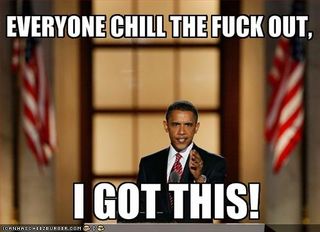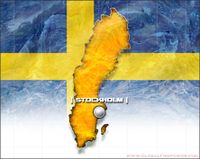Here is what I like most about the President.
He has a clear understanding of the connectedness of things. He knows we need to do big things in order to get out of our present hole.
But he's willing to adjust, and test, the ideas of his cabinet so that he minimizes his risks and maximizes opportunities.
Take the TARP deal announced today.
While it's being advertised as a $1 trillion attack on Big Shitpile, he's only putting up $150 billion in TARP money. As Brad DeLong notes private parties are expected to put in $30 billion, leading to $820 in FDIC loans to buy the assets. The leverage on the FDIC money is about 5-1, same as you'd get on a conventional mortgage.
This does not leave the government out of bullets. There would still be another $200 billion in TARP money. There remains the Fed's program of easing. The stimulus bill has to be counted. There might be another stim in September.
More important, he's not going to do the whole $1 trillion all at once. He's going for $100 billion now. Only if that works will he put in the whole rock.
Why bring in the hedge funds? To get the best possible price on the assets being bought. When government goes into the market by itself, the government gets hosed by the banks on the other side of the table. By going in through investors, the hope is, you can negotiate better prices in the assets.
The problem is we don't know what "big shitpile" is worth. Is it worth 30 cents on the dollar or 60? It's carried at 60 on most bank books. But it consists of mortgages that may keep paying off even if people go "underwater," along with the possibility that, if they renegotiate, you get your principal back. Not to mention that if they do foreclose at least you get the house. All that might be worth 30 cents on the dollar now, given the price of housing and the huge overhang in foreclosures, but the idea is this is patient money, and that over 5 years you can get 60 cents out, as the rest of the stimulus program takes effect.
Meanwhile you get $1 trillion of crap off bank books which they can then lend out to someone else.
Liberals don't like this. They don't like letting the banksters into a game that, while it puts their money at risk, also limits their risks. They compare it to Hurricane Katrina. Eschaton frets this is going to turn out very badly.
This is in reaction to an officially off-the-record comment from Treasury Secretary Geithner, that "We are the United States of America. We are not Sweden."
This Atrios takes to mean that we're not interested in doing the right thing, which in this case is to nationalize the banks, cut out the equity holders, make the bond holders take a haircut (give them less than their bonds are worth), and then sell the banks back.
In fact, we've already nationalized the banks. We own 80% of AIG. We own 40% of Citi, which means we control it. Any other bank that took TARP money is also under our sway. The banks are, effectively, nationalized.
This means, over time, that they're all going to be broken up, taken down just as Paul Krugman wants. Just not right away. Not until the foreign policy implications of all this are taken care of, implications I continue to emphasize. Sweden can walk away from whatever it owes Hungary — that doesn't blow up Hungary. If we walk away we blow up Hungary. That's why we're not Sweden.
There is a circular firing squad being created by liberals who distrust the banksters and conservative populists who don't trust the government. People who have a little business savvy are taking this opportunity to duck. Even former Club for Growth President Stephen Moore, who now identifies himself as a "Wall Street Journal" guy, was saying nice things about the Administration this morning. And he's the leader of the street's Ferengi faction.
What the President is trying to do now is pull the business community privates out of the economic fire without dropping the ball on our international obligations. He will be able to go to the upcoming G20 meetings in a strong position to demand cooperation, because we're holding up our end.
That should give him the political credibility he needs to come back and tackle health care, energy, and the problems of Latin America. Once the cloud lifts on Bill Richardson he can come out fo the on-deck circle as special ambassador on the drug war, and it all starts to come together.













